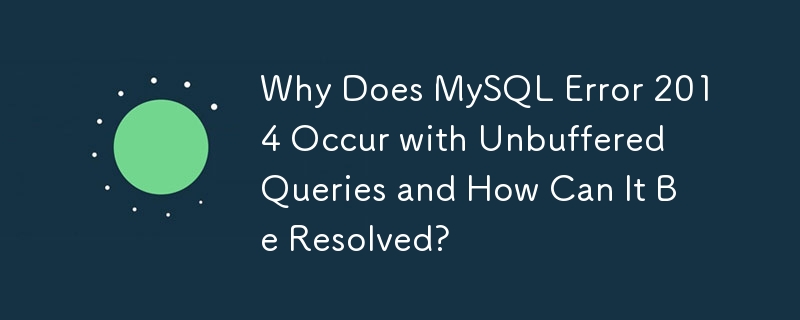Home >Database >Mysql Tutorial >Why Does MySQL Error 2014 Occur with Unbuffered Queries and How Can It Be Resolved?
Why Does MySQL Error 2014 Occur with Unbuffered Queries and How Can It Be Resolved?
- DDDOriginal
- 2024-12-11 02:42:09343browse

Why Does MySQL Error 2014 Occur with Unbuffered Queries?
MySQL error 2014, "Cannot execute queries while other unbuffered queries are active," arises when a query is executed while another unbuffered query is still in progress. Unbuffered queries do not fully fetch all results from the server, leading to the error.
Why Does This Manifest Only with PDO::ATTR_EMULATE_PREPARES=false?
When PDO::ATTR_EMULATE_PREPARES=true, PDO emulates prepared statements. Under this setting, all results are fetched implicitly, preventing the error from occurring. However, with PDO::ATTR_EMULATE_PREPARES=false, PDO uses native prepared statements, which require explicit fetching.
Why Do Some PHP Versions Behave Differently?
Different PHP versions may handle unbuffered queries differently. Older versions might have automatically fetched all results, while newer versions adhere more strictly to the MySQL protocol, resulting in the error when unbuffered queries are used.
How to Resolve the Error
To resolve the error, there are several options:
- Use PDO::MYSQL_ATTR_USE_BUFFERED_QUERY=true: This will enable buffered queries, where all results are automatically fetched by PDO.
- Use fetchAll(): This method explicitly fetches all remaining results from a query, closing the cursor and allowing subsequent queries.
- Use closeCursor(): This method explicitly closes the cursor for a query, freeing up resources and allowing subsequent queries. Note that this should only be used after all results have been fetched.
Recommendations
It is generally recommended to use buffered queries for small result sets or when it is essential to access results sequentially. For large result sets, fetchAll() can be used to eagerly load all results into memory. closeCursor() should be used carefully to avoid prematurely closing cursors and potentially losing results.
Additionally, it is advisable to use the mysqlnd driver for improved performance and compatibility with PHP.
The above is the detailed content of Why Does MySQL Error 2014 Occur with Unbuffered Queries and How Can It Be Resolved?. For more information, please follow other related articles on the PHP Chinese website!

